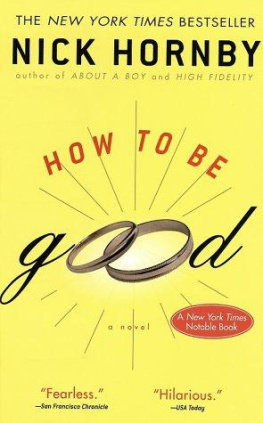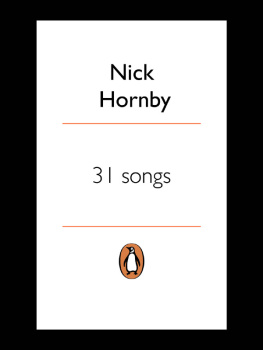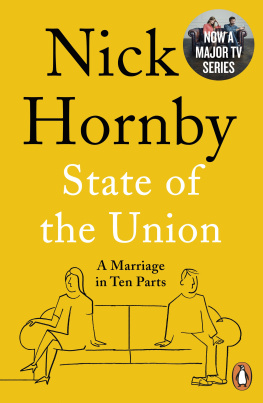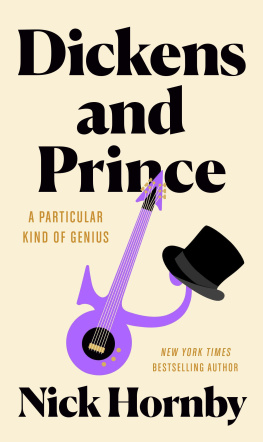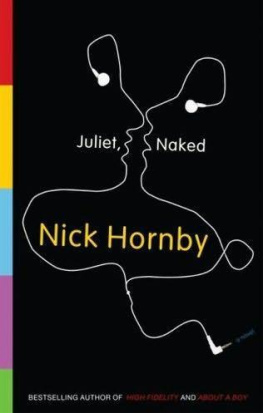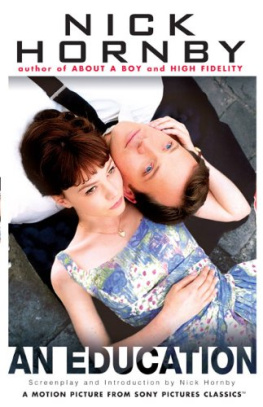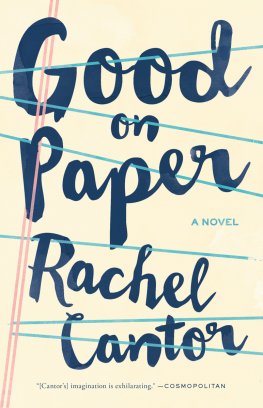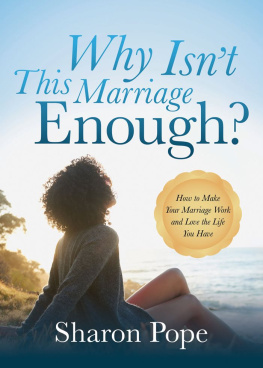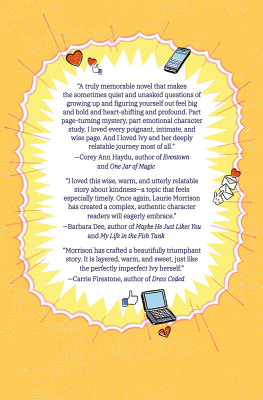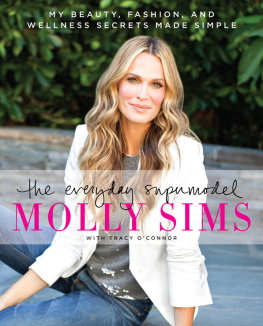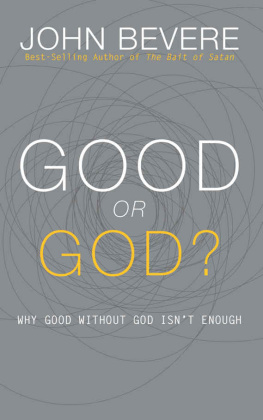'It does exactly what it says on the cover... Hornby's prose is
afternoon in a nearby park... a great book that will have the proto
produced... only this writer has the wit and the stringency to take
'Enormously readable and ultimately powerful...
'Nick Hornby has raised his game... a good, dark,
of vanity... Hornby writes astonishingly well from a woman's
perspective... entertains superbly... I went back to the
Nick Hornby was born in 1957. He is the author of Fever Pitch and of three novels: High Fidelity , About a Boy and How to be Good . All four books have been international bestsellers and all are available in Penguin. He has also edited two anthologies, My Favourite Year and Speaking with the Angel . In 1999 he was awarded the E. M. Forster Award by the American Academy of Arts and Letters. He lives and works in Highbury, north London.
How to be Good
NICK HORNBY

PENGUIN BOOKS
PENGUIN BOOKS
Published by the Penguin Group
Penguin Books Ltd, 80 Strand, London WC2R ORL, England
Penguin Putnam Inc., 375 Hudson Street, New York, New York 10014, USA
Penguin Books Australia Ltd, Ringwood, Victoria, Australia
Penguin Books Canada Ltd,
10 Alcorn Avenue, Toronto, Ontario, Canada M4V 3B2
Penguin Books India (P) Ltd, 11 Community Centre, Panchsheel Park, New Delhi -110 017, India
Penguin Books (NZ) Ltd, Cnr Rosedale and Airborne Roads, Albany, Auckland, New Zealand
Penguin Books (South Africa) (Pty) Ltd,
24 Sturdee Avenue
, Rosebank 2196 South Africa
Penguin Books Ltd, Registered Offices: 80 Strand, London WC2R ORL, England
www.penguin.com
First published by Viking 2001
Published in Penguin Books 2001
Copyright Nick Hornby, 2001
All rights reserved
The moral right of the author has been asserted
Set in Monotype Dante
Printed in England by Clays Ltd, St Ives plc
Except in the United States of America, this book is sold subject
to the condition that it shall not, by way of trade or otherwise, be lent,
re-sold, hired out, or otherwise circulated without the publisher's
prior consent in any form of binding or cover other than that in
which it is published and without a similar condition including this
condition being imposed on the subsequent purchaser
For Gill Hornby
Acknowledgements
Thanks to: Tony Lacey, Helen Fraser, Juliet Annan, Joanna Prior, Anya Waddington, Jeremy Ettinghausen, Martin Bryant, Wendy Carlton, Susan Petersen Kennedy, Amanda Posey, Ruth Hallgarten, Caroline Dawnay, Annabel Hardman, Mary Cranitch, Anna Wright and Gaby Chiappe.
I
I am in a car park in Leeds when I tell my husband I don't want to be married to him any more. David isn't even in the car park with me. He's at home, looking after the kids, and I have only called him to remind him that he should write a note for Molly's class teacher. The other bit just sort of... slips out. This is a mistake, obviously. Even though I am, apparently, and to my immense surprise, the kind of person who tells her husband that she doesn't want to be married to him any more, I really didn't think that I was the kind of person to say so in a car park, on a mobile phone. That particular self-assessment will now have to be revised, clearly. I can describe myself as the kind of person who doesn't forget names, for example, because I have remembered names thousands of times and forgotten them only once or twice. But for the majority of people, marriage-ending conversations happen only once, if at all. If you choose to conduct yours on a mobile phone, in a Leeds car park, then you cannot really claim that it is unrepresentative, in the same way that Lee Harvey Oswald couldn't really claim that shooting presidents wasn't like him at all. Sometimes we have to be judged by our one-offs.
Later, in the hotel room, when I can't sleep and that is some sort of consolation, because even though I have turned into the woman who ends marriages in a car park, at least I have the decency to toss and turn afterwards I retrace the conversation in my head, in as much detail as I can manage, trying to work out how we'd got from there (Molly's dental appointment) to here (imminent divorce) in three minutes. Ten, anyway. Which turns into an endless, three-in-the-morning brood about how we'd got from there (meeting at a college dance in 1976) to here (imminent divorce) in twenty-four years.
To tell you the truth, the second part of this self-reflection only takes so long because twenty-four years is a long time, and there are loads of bits that come unbidden into your head, little narrative details, that don't really have much to do with the story. If my thoughts about our marriage had been turned into a film, the critics would say that it was all padding, no plot, and that it could be summarized thus: two people meet, fall in love, have kids, start arguing, get fat and grumpy (him) and bored, desperate and grumpy (her) and split up. I wouldn't argue with the synopsis. We're nothing special.
The phone call, though... I keep missing the link, the point where it turned from a relatively harmonious and genuinely banal chat about minor domestic arrangements into this cataclysmic, end-of-the-world-as-we-know-it moment. I can remember the beginning of it, almost word-for-word:
Me: 'Hiya.'
Him: 'Hello. How's it going?'
Me: 'Yeah, fine. Kids all right?'
Him: 'Yeah. Molly's here watching TV, Tom's round at Jamie's.'
Me: 'I just phoned to say that you've got to write a note for Molly to take in to school tomorrow. About the dentist's.'
See? See? It can't be done, you'd think, not from here. But you'd be wrong, because we did it. I'm almost sure that the first leap was made here, at this point; the way I remember it now, there was a pause, an ominous silence, at the other end of the line. And then I said something like 'What?' and he said 'Nothing'. And I said 'What?' again and he said 'Nothing' again, except he clearly wasn't baffled or amused by my question, just tetchy, which means, does it not, that you have to plough on. So I ploughed on.
'Come on.'
'No.'
'Come on.'
'No. What you said.'
'What did I say?'
'About just phoning to remind me about Molly's note.'
'What's wrong with that?'
'It'd be nice if you just phoned for some other reason. You know, to say hello. To see how your husband and children are.'
'Oh, David.'
'What, "Oh David"?'
'That was the first thing I asked. "How are the kids?" '
'Yeah. OK. "How are the kids?" Not, you know, "How are you?" '
You don't get conversations like this when things are going well. It is not difficult to imagine that in other, better relationships, a phone call that began in this way would not and could not lead to talk of divorce. In better relationships you could sail right through the dentist part and move on to other topics your day's work, or plans for the evening, or even, in a spectacularly functional marriage, something that has taken place in the world outside your home, a coughing fit on the Today programme, say just as ordinary, just as forgettable, but topics that form the substance and perhaps even the sustenance of an ordinary, forgettable, loving relationship. David and I, however... this is not our situation, not any more. Phone calls like ours only happen when you've spent several years hurting and being hurt, until every word you utter or hear becomes coded and loaded, as complicated and full of subtext as a bleak and brilliant play. In fact, when I was lying awake in the hotel room trying to piece it all together, I was even struck by how clever we had been to invent our code: it takes years of miserable ingenuity to get to this place.

